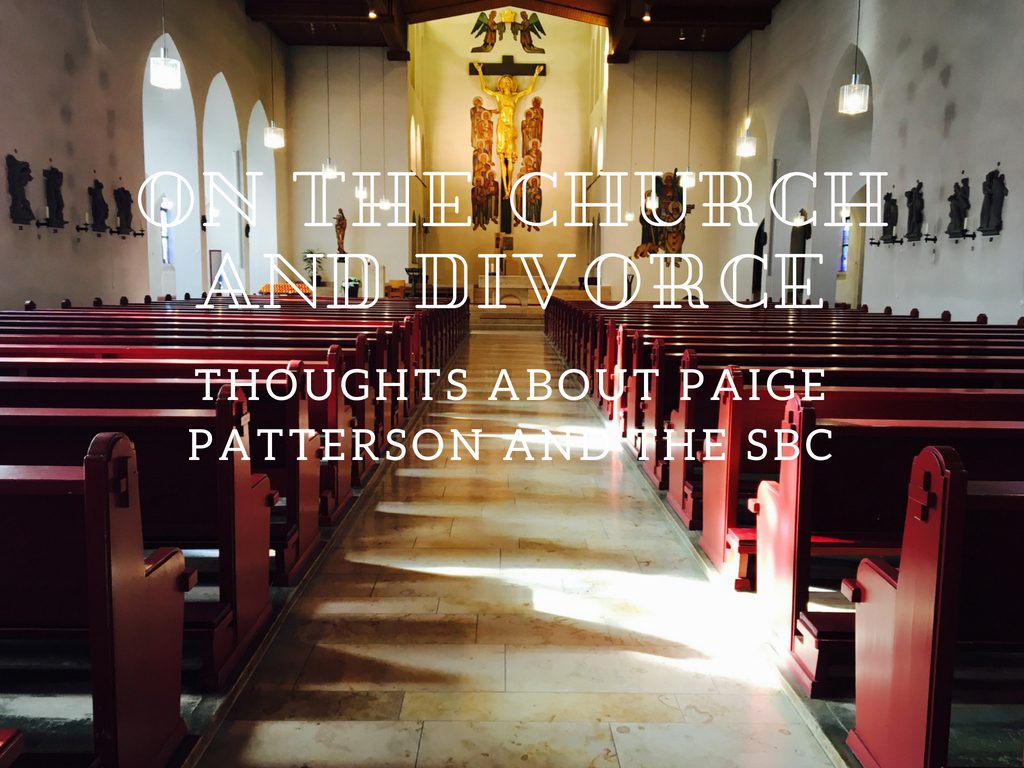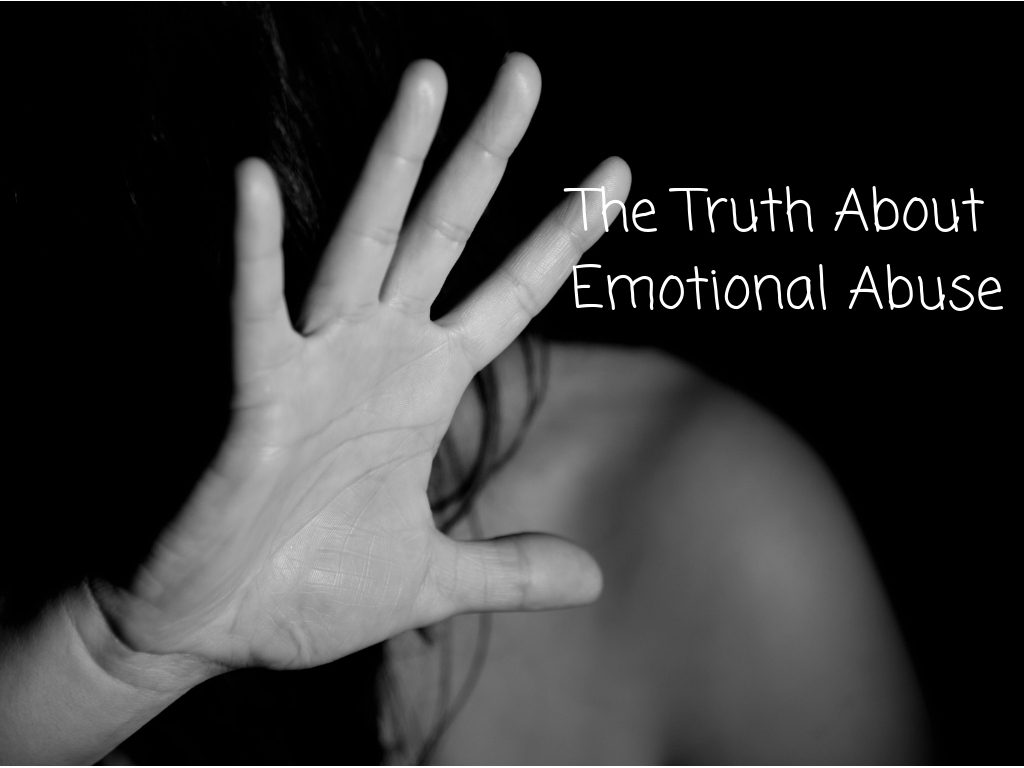On the Church and Divorce: Thoughts About Paige Patterson and the SBC
The last few weeks, a firestorm of controversy has erupted in the Southern Baptist Convention (SBC). Allegations against Paige Patterson, now president emeritus at Southwestern Baptist Theological Seminary, have been made public, allegations that include his stance that women should stay with their abusive husbands and his mishandling of a rape on a seminary campus where he was president.
Let me start by saying that I was raised in the Southern Baptist Church. I attended a Southern Baptist University. I am proud of the strong foundation I received, the adherence to the infallibility of the Word of God.
But I think Baptists have always been seen as legalistic and judgmental. We’ve always been known by what we are against rather than what we are for. Maybe we have been too focused on truth and less focused on love. Maybe we have been more focused on actions and less focused on the heart. Maybe we have been too focused on religion and less focused on relationship.
Whatever the reasons, the SBC has been at the center of multiple controversies, and this one involving Paige Patterson is no different.
However, as a victim of abuse myself, this one strikes at the core of my being.
Let me pause and make two caveats: 1) don’t think for a second that Southern Baptist are the only religious folks who downplay abuse and 2) remember women aren’t the only victims of abuse. I am a woman and a Southern Baptist, so I write from that angle. Please know it happens in churches of every denomination and men are often the silent victims.
My story: I spent nearly 17 years as a Southern Baptist pastor’s wife. My marriage ended after unrepentant adultery despite my offer of forgiveness and reconciliation. It was not until I walked away from my marriage that I gained the perspective to see the longstanding abuse I suffered. While I never suffered physical abuse, everything was always my fault (emotional abuse), I frequently endured fits of rage laced with more profanity than I care to mention (verbal abuse). I was frequently told that he was the authority and my responsibility was to submit, regardless of the sin (spiritual abuse). While I didn’t see it at the time, I came to understand that pornography played a huge role in his life and our marriage. The pornography coupled with the adultery (sexual abuse) became the last straw. I would not stand by and let my kids see me abused, let my kids think it was appropriate for a husband to leave the covenant and the wife to stand by and allow it to happen.
Some would argue what I endured was not abuse. Some would argue it simply wasn’t as bad as what I’m making it out to be. Some would argue my responsibility was to stay and pray for God to do a work in Him and in our marriage.
And that’s where the church’s response to abuse gets sticky.
You see, I’ve known many women (and men) who have been told that what they describe just really isn’t that bad, that they don’t have biblical grounds for divorce. And yet, you have never been behind the closed doors of their homes. Mental and emotional abuse, when described to others, doesn’t always seem that bad. Yet, the victims are left with no confidence, no vision of who they are in Christ. They are led to believe they don’t deserve to be loved as Christ loved the church, that they brought all of the pain upon themselves because they don’t love or respect their spouses enough. They become a shell of themselves, failing to fulfill their God-given purposes because their spouses won’t allow them to. And this persona—brought on by the emotional and verbal abuse heaped upon them—is designed to keep them captive, to make them too fearful to ever walk away from their abusers. It’s a control issue by narcissistic individuals hell-bent on keeping what they rightfully own.
How does the church respond?
It runs the gamut. Let me start by saying many churches and ministers lovingly and gracefully handle abuse and divorce. And praise God! Our Savior is the only one who can heal the hurts and make victims of abuse whole again. It takes the Church, God’s people, embracing the victims with love and compassion, helping the victims understand who they are in Christ to reach a place of healing and wholeness.
Yet, many other churches and ministers—sometimes intentionally and sometimes unintentionally—multiply the pain these victims experience.
I’ve heard from so many people over the years who have told me their pastors told them to stay and pray in spite of rampant abuse. I’ve heard stories of victims who were ex-communicated from their churches. I’ve heard people tell how their abusive spouses were allowed to stay in leadership positions in the church while they were shunned.
Those are the intentional wounds, much like the allegations against Paige Patterson. But what about the unintentional wounds?
I’ll never forget the day I was sitting in church, my heart bleeding everywhere from the pain of an unwanted divorce. I didn’t know where else to go but to church, the place my entire life revolved around. As I sat, begging for a little hope, a little encouragement, the pastor made a stereotypical comment about “divorced people.” Just stick the knife in and twist. Make me bleed a little longer, a little harder. Watch as the life drains out of me. In that moment, I wondered what I would have done if I had been someone outside the church, outside the faith, simply looking for that hope I had heard Jesus could give. I wondered if I would ever step foot in the church again after enduring such a careless comment from the pulpit. I wondered if someone whose faith was not as strong as mine would have ever returned to church, to my Savior, the only one able to heal the broken heart.
Or maybe it was the days leading up to my divorce when I endured the sermons on the sanctity of marriage, when I heard the exhortations to never give up. I understand the complications of preaching to a diverse audience, to those enduring “normal” marriage problems interspersed with those of us enduring ongoing abuse. I understand the need to preach on the covenant, on the importance of fighting for your marriage. But, when you have abuse victims who love Jesus and never saw divorce as an option sitting in the congregation, it clouds their ability to hear God tell them it’s ok to walk away. You see, I begged God to give me wisdom, to tell me if I should stay and keep praying or if I should walk away. I was raised to believe divorce was not an option for the Christian couple, so I continued to cling to the hope God would restore my marriage. After all, that’s what good Christians do. I had so many trusted advisors, dear Christian friends, telling me God had clearly told them it was time for me to walk away. Yet, I couldn’t hear God say it directly to me. And every time I almost came to peace with divorce, I heard a sermon on never giving up on your marriage, a sermon that set me back and caused me to second-guess, a sermon that told me I would somehow be less of a Christian if I didn’t endure. That was more than this Jesus-loving divorcee could handle. I didn’t want to disappoint my Savior. So I stayed…long after I should have left.
Then there are those who treat divorce as the unforgiveable sin. Yes, individual scriptures pulled out of the greater context of the Bible used to label you an adulterer condemned to hell. Or those who hold to the belief that if you divorce, you are required to pine away celibate for the rest of your lives. I’ll never forget the individual who told me the only reason David and Bathsheba’s marriage could be blessed was because Bathsheba’s husband was dead. If you remember, the only reason Bathsheba’s husband was dead is because David had him murdered. According to this individual, David’s marriage to Bathsheba could not have been blessed by God without the murder. So, in this strange theology, murder was somehow ok but not remarriage.
So what should the church do? How should any type of abuse be handled? What are some things ministers and church leaders can remember as we face this controversy of abuse/divorce and the church?
Remember you don’t know all the facts on any divorce. I would dare say far more divorces happen as a result of addiction, abuse, and adultery than any other reason. Few people throw in the towel over minor issues. I encourage you to look at every divorce/divorcee with eyes of grace and compassion. Assume there was some type of abuse involved. Use discernment when taking sides. Listen and watch carefully, looking for signs of deeper problems than you expected.
It’s possible the victim doesn’t even see the abuse…yet. It’s possible the victim doesn’t even want the divorce. It’s possible the divorce was thrust upon an unsuspecting victim. It’s highly likely the abuser still maintains a considerable amount of control over the victim. Be cautious in recommending reconciliation because you might be encouraging a victim to return to her abuser. Simply love. Listen. Support. Care.
Abusers are typically very congenial. They are well-liked. They present themselves perfectly in public. I promise the abuser will appear repentant, contrite. He/she will play the part of the hurting spouse. He/she will be the perfect little Christian in public. But, you simply don’t know what has been going on behind closed doors.
Minister to those reeling from divorce just like you would a widow or widower. Divorce is a death. In my eyes, it’s often worse than a death because your entire marriage seems as if it was a sham. You are left rejected, unloved. You lose friends, family, and finances. No part of your life is untouched.
Yet, the church is not equipped to handle divorce. Sure. I had kind people slip me a little money here and there. I had encouragers come alongside me and take me to breakfast. But there is no organized effort to help the divorcee. There are no meals delivered to make sure there’s nutritious food available. There are no GoFundMe accounts to help put shoes on the kids’ feet. There are no on-going ministries to make sure you have the support you need. Divorcees are just left to pick up the pieces with little to no support.
Don’t preach Malachi 2:16 without the surrounding context. I’ve always heard the phrase “God hates divorce” (Malachi 2:16), but until my divorce I had never heard the surrounding context. You see, the entire context of Malachi 2:16 is about the husband who abuses his wife, of how his unfaithfulness heaps pain upon her. The warning is not about the divorce, but about the rampant sin that leads to divorce. And while we are here: I don’t believe God is calling out divorce as a sin. Instead, I believe He hates divorce because as a Father His heart breaks for the pain and devastation divorce causes His dearly loved children.
I’ll take it a step further: don’t preach any sermon on divorce without a caveat to those who are in such sick, dysfunctional, abusive marriages. Andy Stanley preached a sermon on marriage a few years back, and he forever gained my respect. As he talked about the importance of fighting for our marriages, he paused and added a caveat. He made a statement about those in abusive marriages and gave victims permission to walk. It was years after my divorce, and yet those words of affirmation meant more to me than I could ever express.
Understand that sometimes the description of emotional abuse is not as bad the reality behind closed doors. While physical abuse is a no-brainer, emotional and mental abuse is often subtle and difficult to describe. As victims, we may talk about the fits of rage we endure. We may talk about walking on eggshells, never knowing what is going to set off our spouses. We may talk about the verbal assaults, the language, the name-calling. And the people around us may not truly grasp the danger, the pain, the depth of sickness we endure. Even the victims may not fully grasp the depth of abuse they are suffering.
Emotional abuse is often subtle, and it is always designed to tear the victim down, to make the victim feel as if it’s all his/her fault. Emotional abuse destroys every ounce of self-respect and self-confidence the victim has. Emotional abuse makes the victim feel as if everything will be ok if only he/she could get his/her act together.
Emotional abuse may be subtle and difficult to comprehend, and yet the damage is severe. It can cripple the victim for life, inhibit his/her ability to function in relationships. It can cause severe depression and feelings of self-doubt and self-hatred.
Treat divorce like any other sin you or anyone in your church has committed. Divorce is not the unforgiveable sin…if it is sin at all. I have yet to find a sin we as humans can commit that God sees as unforgiveable. We are all sinners forgiven by the glorious grace of our Heavenly Father. Whether it’s pride or greed or lust or gluttony. Maybe it’s addiction or adultery or hatred or anger. Maybe it’s bitterness or unforgiveness or idolatry or apathy.
Christ’s blood is greater. It is greater than every sin known to man. It is greater than murder and adultery and abuse. And it is greater than divorce.
The ironic thing is I’m not even sure divorce is a sin. Sure, the actions that lead to divorce are sinful, actions of self-centeredness and neglect. But the divorce itself?
In some circumstances, it may actually be sinful to stay in a marriage. Look at it this way: If your spouse is abusive or an addict and you choose to stay and overlook the sin, you are enabling your spouse to live in sin. You are allowing sin to run rampant in your family, to affect your children. If your spouse is abusive, you most likely aren’t being allowed to fulfill the purpose for which God created you. In some situations, it just might be more sinful to remain in a marriage than it is to divorce.
Remember staying in an abusive marriage harms both the victim and the children. It might be the best thing for those both the spouse and children to get away. We’ve talked about the damage to the victims of abuse, but what about the children? As parents, we are responsible for protecting our children, for making sure they are raised in the right way. When we stay in abusive marriages, our children learn the abusive, manipulative, controlling ways. They learn that treating a spouse with contempt is acceptable and appropriate. Children raised in abusive homes suffer emotionally, believe they are unworthy or unacceptable. When these children are taken out of the abusive environment and raised in a normal, loving environment, they learn to discern between right and wrong and how to love and relate appropriately.
In short, the Church—the SBC and other denominations—must learn to handle women, abuse, and divorce in a manner that is reflective of the grace and love of our Savior Jesus Christ. Ministers must learn to balance their zeal for the institution of marriage with the value of human beings. We must reach a place where we really stop and evaluate individual scriptures in light of the Bible as a whole. We must realize that we, as Christians, should be known by our love.







This is encouraging to me. I love that more and more people are waking up to the downplay of abuse in the Church, the bride of Christ, where we are supposed to be safest. Instead, many welcome in the wolves. If you haven’t already, you should check out Leslie Vernick. She is a Christian blogger and author on this topic and is a wonderfully brilliant woman. She helped me to leave my abusive marriage.
Thank you for this!
Love
M
Thank you, Dena, for a very well-written post on an important topic!
Of your many good points, I think this is my favorite: “In some situations, it just might be more sinful to remain in a marriage than it is to divorce.”
Although, I might prefer to phrase it in a more positive light…
“In some situations, it is more godly to divorce than to remain in the marriage.”
I blog and write quite a bit on this topic. Here is one of my posts dealing directly with godly divorce: http://josephjpote.com/2015/01/god-of-divorce/
I would love a post to combat the myth I have heard over and over again. I have been told (even this week), that if a marriage fails, there is sin on both sides. Another way I have heard it is “it takes two to tango” as if you or I can be held Responsible for our spouses adultery or of his divorce of us. This seems to be quite popular in Christian Counseling Education. No where that I can find in scripture is there record of God holding one person responsible for the sins of another. Why is this taught? It heaps additional grief, pain, guilt on the victim of adultery and divorce, when it is totally possible that the decisions to sin were made totally on ones own. Thoughts?
Sent from my iPad
>
Oh! Don’t get me started! ???? I’ve said it many times, many ways. It only takes one hard heart to destroy a marriage. I think I actually wrote a post a few years back. Let me try to find it and re-post.
Yeah…I hate that one, too.
Here is a post on my blog where I discuss that particular myth: http://josephjpote.com/2012/08/the-it-takes-two-lie-2/
Thanks!
You’ve written a good article, but you might add a trigger warning. I suffer from C-PTSD, MDD, panic disorder and anxiety disorder as a result of staying 40 years in my “Christian” abusive marriage. Your descriptions were so accurate and familiar, they triggered some flashbacks, panic and anxiety. My marriage took me to the brink of death. Only through the fumbling, compassionate counsel and support of my church did I come out of denial and draw a boundary line. It was immediately violated and I filed for divorce. My church stuck by me in every way. I probably would have died in that abuse without their support. We must keep shining the light in the darkness.
Wow. I’m sorry you had flashbacks. I never dreamed my words would have that power. Even as I wrote, I thought, “I sound like a lunatic. These descriptions just don’t sound that bad.” I am SO glad your church has surrounded and supported you.
Thank You for this excellent perspective. It’s time the church wake up and start supporting rather than judging and condemming those that have been abused in marriage which God abhors and does not in any way condone. I especially love your referring to the correct context of “God hates divorce” in Malachi.
You described my marriage to a T and I sought thru the church, support which I did receive. However, I was too ashamed to tell them about the great emotional and sometimes physical abuse I suffered so they didn’t get the whole picture. It’s very difficult to sit in front of a group of people and describe abuse and open up about feelings. I had no self confidence or respect or self worth and was an empty shell depleted and deprived of any personality. Anything I did was my fault and never good enough. I feel as though now I’m finally starting to become the person God meant for me to be. I will say that the abuse was inexcusable but I never should have married an unbeliever. I’m grateful for the prayers that helped facilitate the clean and even ‘friendly’ divorce which was a blessing. Thanks again Dena. Blessings to you and your Family
Thank you for taking the time to detail this perspective. I’m grateful more in the faith are understanding the nuances that take place and embracing divorce. I’m sharing this!
Thank you so very much for this article. My former church didn’t desert me for the divorce,though. It was the lack of large contributions from me, such as had come from my ex-husband. Money was always their #1.
I’m so sorry. That’s so anti-Christ I don’t have words
Dena…..THE best article on church and divorce I’ve heard. (And THANK YOU for remembering the physically abused husband. )
Hard to do justice to such a topic. Praying more men speak out and bring light to the male abuse victim.
Thank you! You have spoken the things I’ve not had the courage to share in the past year as I also experienced my unwanted divorce from a very emotional and verbally abusive man. I unfortunately did experience some physical and sexual abuse too. And he used my faith to spiritually abuse me.
Some day I hope to have the courage to openly share my story.
I pray God gives you strength to heal, to share, to help others.
Spot on again, Dena! Thank you for adressing Malachi 2:16 and that divorce isn’t necessarily sin – massive issues in my story. I know it’s hard to hear and trust the whispers of his still small voice when the church is yelling at you. God recently spoke to me through my (new) pastor and his sermon on divorce. God hates it because he has felt the pain of it. he has been divorced (israel) and remarried (new testament christians).
You and your articles have been a rock for me throughout my journey. Thank you for allowing God to redeem your story for others’ healing. Blessings, sister.
Thanks Dena, you took the scarlet letter “D” off the chest. My husband was much as you described, he finally cheated and walked away. I struggle with bitterness, God allowed him to have his dream job in his dream location, it would seem life hasn’t skipped a beat for him and all ya sunshine and roses. I struggle, money is tight, I’m so blessed to get to further my education, but life is hard. I wouldn’t go back though. God is good and He is putting the broken pieces of my shattered life all into place. Blessed be the name of the Lord who gives and takes away.
Amen! You will not only survive…you will thrive! Hold close to the Father! 1 peter 5:10
Spot on Dena!
Great article!! Thanks for sharing these profound thoughts! May the church become the place of healing and refuge that God intended.
Amen!
Amen! Extremely well said. Thank you
WOW! You so perfectly described my marriage, and why I am divorced. Thank you.
This is something I needed to read. Thank you for this.